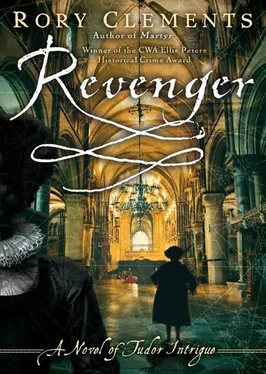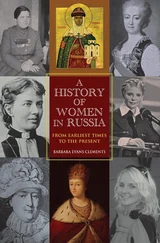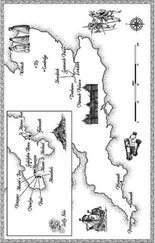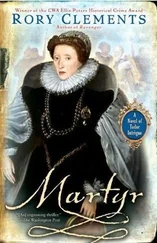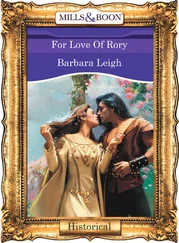“For pity’s sake, one of you help me!”
Shakespeare looked up startled at the sound of Catherine’s anguished voice. She had the ladder against the wall and was almost at the top of it, holding the body of Eleanor Dare, taking her weight.
Shakespeare heaved himself to his feet and ran to the ladder. He shinned up, first encircling his arms around Catherine, then pulling himself higher and taking the weight of Eleanor, whose body hung as limp as a slaughtered pig.
“Ease yourself down,” he commanded Catherine. “And reach for my knife.”
Releasing her grip on Eleanor, Catherine slid down under her husband’s body. She found his dagger in its sheath and handed it to him. Taking Eleanor’s full weight in his right arm, he reached up with his left hand and sliced and slashed at the hemp rope. Fiber by agonizing fiber, he cut through the taut cable until suddenly she slumped away from it, the noose and a foot of rope still about her neck. Clumsily he slipped down the rungs, holding her over his shoulder.
He laid her out on the ground and fought to loosen the rough noose from about her neck. Finally it was free. He put his ear to her chest. A heartbeat. He was sure he could hear a heartbeat. Pulling her lean young body up into his arms so that she sat upright against him, her head over his shoulder, he smacked her back as he would a baby that needed winding.
Of a sudden, she was coughing, her rib cage beating against his chest in spasms. She was sucking in air, gasping. She was alive.

C ATHERINE WATCHED Eleanor return to life and crossed herself. Her thoughts had been in the Gatehouse Prison, where she had held Father Southwell’s limp, dead-weight body, tormented against Topcliffe’s wall. Please let me save this woman where I could do nothing to save Robert , she had prayed as she held Eleanor’s hanging weight at the top of the ladder. O Lord, show your mercy .
“Thank God,” she said now. “Thank you, God.”

S HAKESPEARE AND Boltfoot bound McGunn hand and foot with the length of rope used to hang Eleanor. They knew it must cause him immense pain to have his broken arm so restrained, but they did not care much. While life still flickered in this man’s breast, he was a danger.
They examined the three dead bodies. Shakespeare thought they might be among the Irish beggars that congregated around Essex House. He recalled the words McGunn had used when first they saw them: “They may be only beggars, but they are our beggars.” Men he paid so that he might call on them whenever he had some dirty work to be done. They were his men, and now they had died for him. But who was the squat one whose body McGunn had held aloft in triumph, mistaking him for Boltfoot? They studied his face closely. “All I can think is that he was one of those vagabonds we encountered as we turned from the road, come scavenging for food,” Shakespeare suggested.
Boltfoot nodded toward the woods. “There’s another one in there. I clubbed him and took the pistol from him. He might be still alive. We’d better get him. The one who came first, in front of the cottage, is dead, though. I’m certain of that.”
They dragged McGunn to the little house while Catherine tended to Eleanor. In the larger of the two rooms, they tethered the wrist of his uninjured arm to a ring embedded into the wall and made a rough splint, which they fixed to the broken forearm. He sat there sullenly, his eyes full of malice and no remorse.
Boltfoot went out to find his caliver and take the firearms, swords, and daggers of the dead men. In the woods, he found the man he had clubbed. He was still breathing but unconscious. Boltfoot tied his inert body to a tree and left him there to soak in the unceasing rain. As to the dead men, they would deal with them in the morning.
Helped by Shakespeare, Catherine had brought Eleanor to the shepherd’s cottage. She had her hand to her fiercely swollen throat, and though she was weak and faltering, she was conscious and able to walk slowly. They sat her down in the other room and gave her sips of ale to try to soothe her. Catherine gathered up capes and blankets and made a palliasse for her to lie on.
“Sleep, if you can,” Catherine said gently. “You are safe now. I will stay with you.”
In the other room, Boltfoot had his caliver, now dried and primed with fresh gunpowder, trained on McGunn. Shakespeare ignored the blood seeping from his own wounded shoulder and took over. “It were best if you ride for Masham, Boltfoot, to the constable.”
Boltfoot nodded obediently and handed the weapon to his master.
McGunn looked at his captor with eyes that seemed strangely resigned. “Would you have a sup of ale for me, Mr. Shakespeare?”
Shakespeare had a flagon at his side. He held it to McGunn’s lips. He drank thirstily.
“Thank you,” he said. “You can stop pointing that thing at me, you know. I’m not going anywhere.” He nodded his close-shaved, pulpy head at the caliver.
Warily, Shakespeare placed the caliver on the dirt floor, well away from his captive but close enough to his own right hand.
“I will be dead soon. I wanted to tell you a thing or two. Explain, perhaps, though I don’t expect anything from you in return. I have no remorse and I seek no redemption. But someone should know what this was about. You might think I am going to hell, but I know that hell is here, in this world.”
“Tell it to the justice.”
“No. I’m going to tell you. It was the autumn of 1580. I was a farrier in those days. I had never picked up anything more lethal than a hammer and never struck anything but an iron shoe on the anvil in anger. I had a wife and was about to have a child. My wife-my beautiful fine girl-was called Maggie Maeve and I loved her more than life itself. You’d know about that, Shakespeare. You have a beautiful fine girl yourself.
“We lived a little inland, in a farm village. Maggie Maeve’s widowed mother lived at the coast, at Smerwick, or St. Mary Wick-well, that’s its English name. It is a lovely harbor village, a little way north of Dingle Bay on the southwest coast of Ireland. Maggie Maeve was heavy with child when she went to visit her mother that October. She had no idea-how could we-that a Catholic force of a few hundred Spaniards and Italians had landed and that the English were coming for them, in force. Four thousand blood-hungry savages from this monstrous island, who had no cause to be in my country.
“Maggie Maeve found herself trapped, along with the Spanish and Italian soldiers and two hundred Irish men and women who had joined them to fight the English. She had no way back to me, for the English laid siege to their makeshift fort with artillery. All escape was blocked off. After three days of bombardment, it was clear the situation was hopeless and so the besieged Spaniards and their Irish allies hung out the white flag of misericordia . They then surrendered, believing their lives were to be spared.”
“What happened?”
“What do you think happened, Mr. Shakespeare? The English slaughtered them. Every man-excepting the few Spanish nobles that might raise a ransom-was disarmed, bound, and cut to pieces one by one by the English soldiery. Butchered like oxen: a hack of the sword to the neck, sometimes severing the head, sometimes not, then a thrust to the stomach to make certain. Hew and punch. That was what they did to the men. First, though, they saw to the few women that they had caught. Nor was Maggie Maeve the only one with child. They hanged them by the neck until they were dead. They strung up Maggie Maeve like a common criminal, though she was nothing of the sort. She was a beautiful fine girl with a smile and laugh that would light a room brighter than a thousand beeswax candles. They strung her up and killed her and my unborn child. She looked a lot like your wife, Shakespeare. Long dark hair, blue eyes.”
Читать дальше
